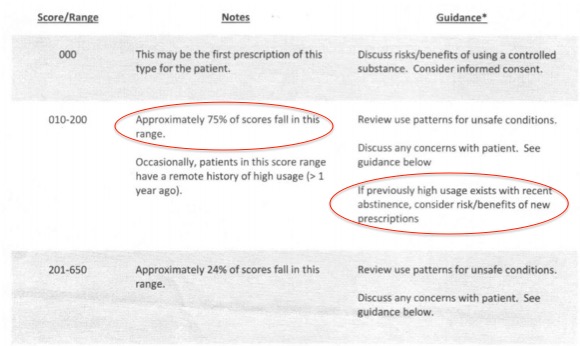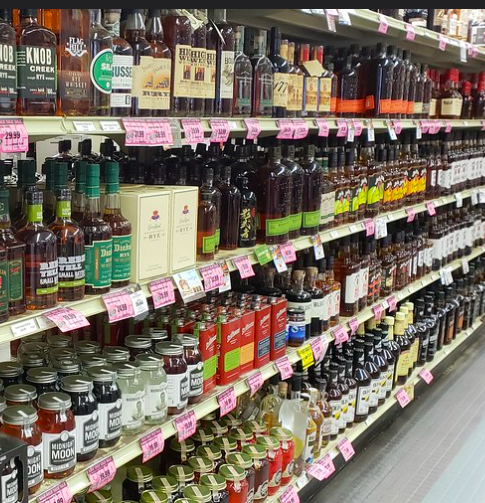
In the name of battling our misnamed "opioid epidemic," (1) which has only resulted in making things worse (2) there is a casualty that is far worse than anything that could be caused by a drug - the loss of our right to make healthcare decisions with our own providers and the right to privacy. A whistleblower document from Walmart which I obtained discusses "scoring" patients based on their medical and prescription history. It should terrify you. And it will. Following are some passages from the seven-page document, which, despite its benign-sounding title, is anything but.

What you will read is not guidance. It is all but certain it will become a mandate, just like the CDC 2016 Opioid Prescribing Guidelines are now law or becoming law in most states. And it goes far beyond its alleged goal of helping to control opioid overprescription. Very far beyond. Here are some "highlights" that Walmart does not want you to know about.
Page 1: Pharmacist "guidance" for prescription drug users with different scores as determined by NarxCare (2), an algorithm designed to sniff out potential problems with the legal use of certain prescribed medicines.

Two things jump off the page here. First, the group that encompasses people with scores of 10-200 represents most of the people with a prescription. In the red circle on the right, it becomes obvious how badly Walmart is overstepping. Let's get this straight. If I have a legitimate prescription for Vicodin from my doctor I do not want to "consider the risks/benefits of new prescriptions." Here's how healthcare works:
- The doctor writes the prescription
- The pharmacist fills the prescription.
- There is no #3
You may wonder what it takes to get into the 10-200 scoring group. Not much. From page 2:
Out of the blue, we are no longer talking about painkillers. Walmart is now interested in other potential drugs of abuse. If you happen to be taking Vicodin for chronic pain, Valium as a muscle relaxant, and an ADHD drug - a legitimate combination for some patients, you are going to get a worse score, which will likely mark you as a higher risk.
Which may make you wonder about this:




Alcohol aisle in a Florida Walmart? Photo: flickr
It would seem that Walmart wants to know if you are taking Valium, which kills (on its own) approximately zero people per year, or Ritalin, but will cheerfully sell enormous quantities of alcohol, which is responsible for 88,000 deaths per year. Does anyone believe that Walmart wants to limit your drinking? Unlikely:
"Walmart is already the nation's largest beer retailer after tripling its total alcohol sales in the past 10 years. But one of the chain's top executives told beer distributors this week that the company is just getting started...'I'm pleased but not satisfied,' Chief Merchandising and Marketing Officer Duncan Mac Naughton said during a presentation at National Beer Wholesalers Association meeting in Las Vegas, noting that the company is still "under-shared" in beer sales compared with competitors.
Ad Age October 2013
It gets worse.

This is really awful. First, if you use an MME calculator it becomes quickly obvious that Walmart is not talking about addicts who are taking huge doses of opioids. But that doesn't stop the company from treating people that way. And it doesn't have to be much. Walmart calls 40 MME an "unsafe condition," and is recommending tapering or discontinuing other drugs, such as Valium, which could potentiate the action of the opioid. How much is 40 MME? It's equivalent to 26.6 mg of oxycodone - 2.7 10 mg Percocet pills - not even half the maximum recommended daily dose of 60 mg.

The maximal daily dose of Percocet. Source: RxList
It is perfectly clear that patients are going to get some kind of a grade from The Walmart Enforcement Agency and you'd better believe that there will be consequences if that grade isn't good. Good luck getting a legal prescription filled there if you don't make the grade. Pharmacies around the country are already arbitrarily deciding who does or does not get their scripts filled. Although is not explicitly stated it a pretty safe bet that patients could be refused prescriptions because of their score doesn't meet Walmart's "standards."
What can make scores bad? All sorts of things. For example, if you:
- See your doctor too often within a certain time period.
- See more than five different doctors in one year. It doesn't matter if they are dermatologists or cardiologists.
- Use more than four pharmacies in a three-month period.
- Take an average of more 40 morphine equivalents (less than three 10 mg Percocet) in one day
- Take a total of 100 morphine equivalents (total) in a day. There are plenty of pain patients who need more than this just to get by.
Questions that need to be asked
- Walmart sells lawnmowers to people who could run over their own own foot, yet it doesn't claim the authority or ability to monitor and control how they are used. So, how can the company claim it is better equipped than doctors to determine what painkillers, stimulants, and antianxiety drugs you are permitted to buy?
- Walmart sells ovens, but can't teach you how to cook. How does this give it the right or ability to determine who should have their medicines tapered and at what rate?
- What is Appris Health, the company that created the algorithm Narx Care, which does the scoring? How did it get so much information on and influence over our private, personal matters? Why and how did the State of Ohio decide to implement this program in 2017 despite the fact that it already has a Prescription Monitoring Program?
- Why should Appris (and of course, Walmart) have access to our individual health histories? In what other ways will this information be used? What safeguards are in place to safeguard our privacy?
- Why is Walmart lying? The CDC's number, which itself is ridiculous, it 90.
"Within the next 60 days, Walmart and Sam’s Club will restrict initial acute opioid prescriptions to no more than a seven-day supply, with up to a 50 morphine milligram equivalent maximum per day. This policy is in alignment with the Centers for Disease Control and Prevention’s (CDC) guidelines for opioid use."
Walmart press release.
Take a good look in your rearview mirror. Most likely you'll see your right to determine your own medical care growing steadily smaller.
NOTES:
(1) We are having a fentanyl epidemic, not an opioid epidemic. It should be called by its correct name.
(2) Numbers of prescription for opioid painkillers have declined by almost 30 percent since 2011. Total opioid deaths shot up during that same time. Big surprise.



